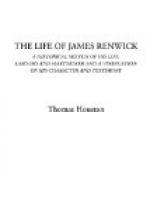Author: Thomas Houston
Release Date: October 18, 2004 [EBook #13781]
Language: English
Character set encoding: ASCII
*** Start of this project gutenberg EBOOK the life of James Renwick ***
Produced by Jordan Dohms and the PG Online Distributed Proofreading Team.
[Illustration]
The Life of
JAMES RENWICK
A historical sketch of his life, labours and martyrdom and a vindication of his character and testimony.
by Thomas Houston, D.D.
Originally this life was written as an introduction
to “The Letters of
Renwick” Published by Alex. Gardner, Paisley,
1865.
Cover Picture: Execution of James Renwick, Edinburgh, 1688.
HISTORICAL INTRODUCTION.
The prophet’s message to Eli, “Wherefore the Lord God of Israel said * * * them that honour me, I will honour,” (1 Sam. ii. 30,) declares a fundamental law of the divine government, which the history alike of individuals and of communities has illustrated in all by-past ages. The works of many men of eminent talent and remarkable energy—admired in their own day,—have speedily passed into oblivion, or have been productive of few permanently salutary results. Despising God, “they have been lightly esteemed.” Those, on the other hand, who honoured God, and were devoted to His service—however humble their talents or position in society,—however contemned and persecuted by the world—have been honoured of God. Their labours have been accepted to advance His glory in the earth—their memories have continued long fragrant, and their principles and character have furnished the most valuable instruction and the brightest examples to future generations.
Of this we have a striking instance in James Renwick,—the last, and in various respects the most illustrious of the Scottish martyrs of the seventeenth century. Hated and persecuted in his own day, by the men in authority in Church and State—caluminated and reproached by ministers and others, who professed evangelical sentiments and affected piety—and his principles generally misrepresented and condemned even to our own day,—there is yet abundant evidence to show that the Master whom he faithfully served, and for whose cause he willingly surrendered his life, singularly owned and honoured him. His faithful contendings and arduous labours contributed not a little to subvert the throne of a bigot and tyrant, and to achieve the nation’s liberties. They served also to secure the purity and independence of the Church, and to transmit a legacy of imperishable principles to future times, when “the handful of corn” upon the top




